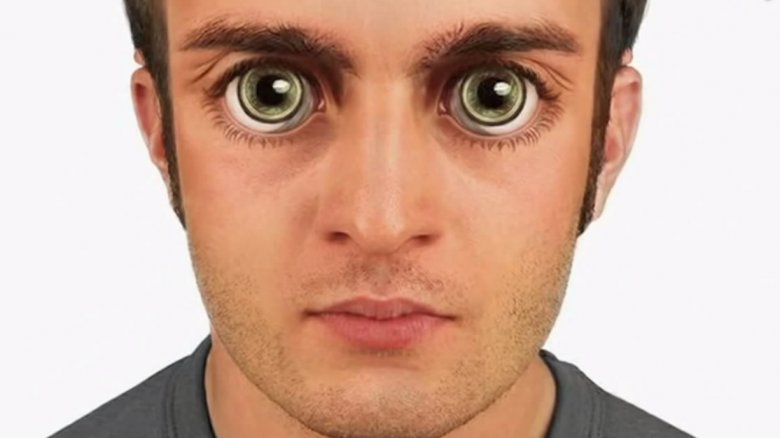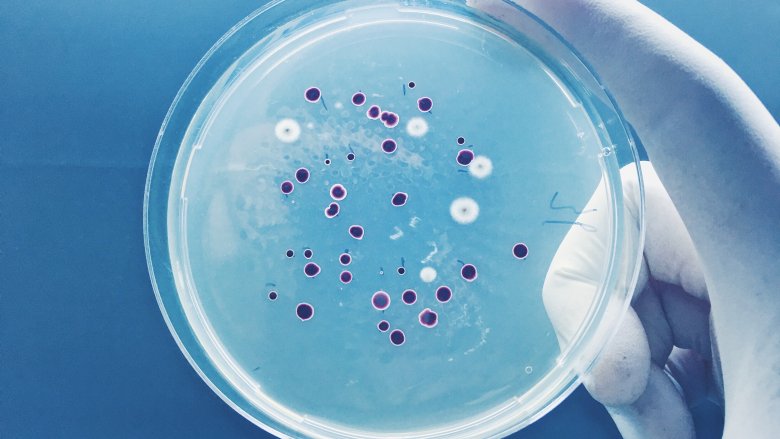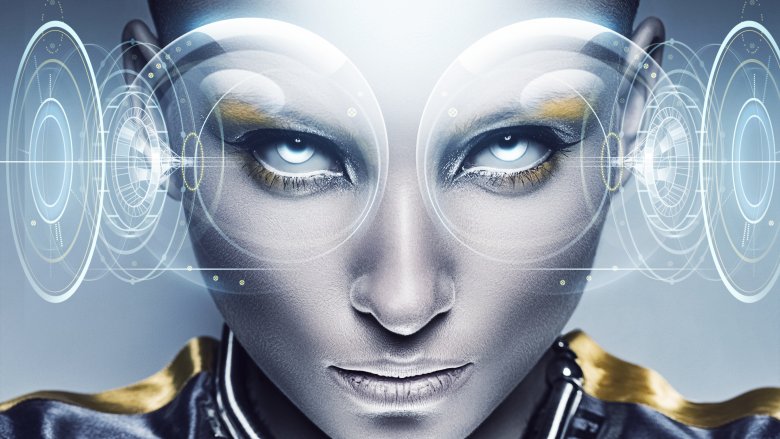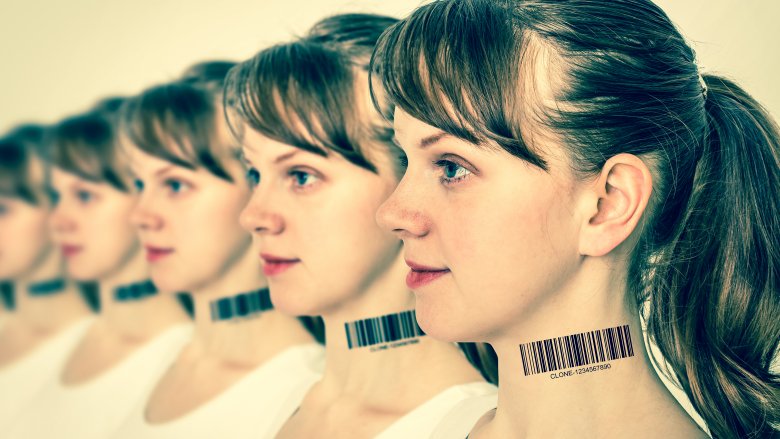Bizarre Theories On How Humans Will Evolve
It's easy to think of the human species as stuck in an evolutionary rut. Medical science sees to it that many people who would have once exited the gene pool will live on to have kids of their own. "Survival of the fittest" doesn't apply anymore, unless you count people who die doing stupid things, like the 3,688 people who died in 2009 because they couldn't be bothered to put a seat belt on. But is it really true that humans a couple hundred thousands years from now will look pretty much exactly the same as they do now? Not everyone thinks so.
Resistance to viruses and bacteria
Doctors and hospitals can help people survive dangerous diseases, but when epidemics like Ebola threaten entire nations, there's only so much that can be done for individual sufferers. What can make a difference is natural genetic resistance to certain diseases — evolutionarily speaking, this is just about as Darwin as it gets. A disease kills most everyone who doesn't have natural immunity, and everyone who does have natural immunity survives and passes those disease-resistant genes on to the next generation. This phenomenon can actually be observed in the modern human population. According to US News and World Report, people who are descended from early European city-dwellers are more likely to have natural resistance to smallpox, while people living in sub-Saharan Africa are more likely to have natural resistance to malaria.
Natural immunity protects not just individuals but entire families. Science Daily reports that because diseases spread quickly within families, having just one person in a family who is resistant to disease will reduce the chances of relatives contracting that illness, thus preserving the entire group. That explains why there always seems to be that one super-annoying family that comes out of a school-wide stomach flu epidemic totally unscathed.
Transhumanism
Human beings are smart, successful, and have pretty much mastered the art of survival, but even Arnold Schwarzenegger circa 1970 wouldn't survive if a meteor landed on his head. Not to put sand in anyone's Cheerios, but human bodies are still frail, and we all have just one future: death. Sorry.
Maybe not, though, if transhumanists have any say in it. According to Humanity+, someday soon you'll be able to have your brain scanned atom by atom and then uploaded into a computer. That way you can live forever and also know exactly what your kids are up to on the Internet.
Transhumanists envision a future where you could be transferred into a robotic body or just hang around in a computer and have some cool virtual reality experiences. You will also avoid ever having to stand in the checkout line at Safeway because an immortal computerized consciousness doesn't have to eat 2.5 cups of vegetables a day. Of course, an immortal computerized consciousness also doesn't get to have cheesecake, which does kind of seem like a fate worse than death.
The disappearance of racial features
Different races evolve when there is population isolation combined with environmentally specific adaptations. That's why Europeans look so different from Africans — the British don't need all that extra pigment to protect them from the hot sun because in Britain the sun only comes out like twice a year, and then everyone is all, "What the heck is that warm, orange ball up there in the sky?"
But according to Mother Nature Network, today there are almost no isolated populations remaining anywhere in the world. People whose ancestors came from Asia or Africa regularly marry and have kids with people whose ancestors came from Europe or the Americas. And if we ever manage to end racism, that mixing of races will become much more common until, as comedian Russell Peters once famously said, "Everyone's just going to be beige."
Humans will have less hair
Every gal loves to run her fingers though some lovely thick back hair, except ew, pretty much no gal loves that. Body hair kind of goes in and out of fashion, with the latest consensus generally being thumbs sideways, at least according to the totally scientific sample of 105 women that Men's Fitness recently polled, who generally agreed that while some body hair is good, gorilla-levels of hairy are not so desirable.
Speaking of gorillas, our ancestors were probably covered with hair, and the fact that we lost most of it through the millennia is actually part of what contributed to our success as a species. According to Peter Wheeler of Liverpool John Moores University, our pursuit of game likely led to the hairless adaptation — large game animals were more abundant in the grasslands, and being hairless made it easier to lose heat and thus to think and function while also covering vast distances under the hot sun.
Then, as humans moved north, they "adapted" to colder climates not by growing out their locks (on the evolutionary timeline the northern migration happened too quickly for that) but by bundling up in the skins of other animals. Today we have wool coats, flannel sheets, and subfloor radiant heating systems, so body hair is totally obsolete. That means we'll likely keep losing it, until ultimately all humans will look sort of like naked mole rats. At that point, being hairy will probably be back in style.
Humans will become wimpier
There was a time when being physically strong did more than help you win Mr. Olympia competitions and get elected governor of California. Physical strength helped you survive and made you more attractive as a mate. Strong people were better hunters and could build sturdy homes, and therefore looked hotter. What about modern humans? Anthropologist Peter McAllister once said that modern man is "the sorriest cohort of masculine Homo sapiens to ever walk the planet," which is a pretty mean thing to say but is also probably not a long way from the truth.
According to Mother Nature Network, machines have replaced much of what we used to do with brute strength — today we have backhoes to dig holes for us, cars to save us from the awful fate of having to walk around, and remote controls to save us from the even worse fate of having to get up off the couch when we want to change the channel.
Besides the fact that we barely need our muscles anymore, a 2014 study published in PLOS Biology hypothesized that humans evolved to be physically weaker because so much of our energy has to be used to feed our oversized brains. All of that doesn't sound good for future humans, who are not only likely to evolve to be wimpier and wimpier, but also to be prone to genetic diseases, which will propagate in the gene pool as medical science works to increase survival rates for sufferers.
Alien planets will fundamentally change us
Portland State University anthropologist Cameron Smith says that humans will evolve off-world in order to adapt to the different environments of alien planets. For example, a thinner atmosphere might lead to broader chests, and lower gravity might give people a lighter build. Space travel might change us, too, especially during multi-generational voyages. Travelers will be bombarded by cosmic rays, which will lead to protective adaptations like thicker eyelids and more pigmented skin. There is also the small problem of cosmic rays rendering the next generation completely sterile, thus totally defeating the whole purpose of space travel, but we'll just pretend like we never heard that because it's not as much fun.
If the thought of having arms like toothpicks or a chest like a swallow freaks you out, don't worry, there are plenty of people who think we'll never even make it off Earth. Hugo Award-winning science fiction author Charlie Stross thinks the logistics of such an endeavor make the whole idea pretty much impossible. "You need either (a) outrageous amounts of cheap energy, or (b) highly efficient robot probes, or (c) a magic wand," Stross wrote on his blog. Which means we're all pretty much doomed to either be burned to death by our dying sun, burned to death as climate change turns our planet into a convection oven, or burned to death when someone finally really pisses off whoever's in charge of North Korea. More likely, we will all perish in a zombie apocalypse. You know that's coming, right?
The human race will split into two different species
Class differences have always been a source of conflict, but there are some scientists who think that the divide between classes will evolve to the point of two completely different species — although to be fair the main purveyor if this idea is a guy who has a Ph.D. in "the evolution of human moral sentiments," which is apparently a thing. According to Live Science, Dr. Oliver Curry says that upper-class people will evolve to be intelligent, lithe, and beautiful, while lower-class people will basically look like the GMO version of Shrek and a bonsai tree, only dumber and not as handsome.
Never mind the obnoxious inference that lower-class people are there because they're ugly and stupid — Curry's hypothesis has other problems, too. It's an example of "sympatric speciation," which is the term for a population that divides into two distinct species even though there is no geographical separation between groups. Why is this a problem? An article from the University of Berkeley explains that sympatric speciation is rare because the preference for members of certain groups to mate only with each other when there are members of other groups in the same population has to be exceedingly strong. In other words, as long as there are at least a few people from the upper class who choose people from the lower class as mates, there's no way natural selection would ever lead to two completely distinct species of human.
Anime eyes
It's really not possible to predict exactly what humans will look like in 100,000 years because so many things could happen. A planet destroyed by nuclear war would produce very different humans than one devastated by extreme climate change, which would produce very different humans than one where everyone plants a tree and lives under the benevolent rule of sentient puppies. But that doesn't stop people from trying to predict it because nothing could be quite as disturbingly fascinating as computer generated images of the horribly malformed humans that might actually be one version of our future.
According to "artist and researcher" Nickolay Lamm (which is an interesting credential, but let's just try to overlook it) and an additional "computational geneticist," the humans of the future will have larger foreheads (to make room for a bigger brain) and larger eyes (to capture more light because we'll be living in the outer reaches of the solar system, where it's darker). And also, we'll all mostly look like George Clooney, who incidentally has a face that London cosmetic surgeon Julian De Silva recently declared to be 91.86 percent perfect. That's because we'll all naturally select for other people who look exactly like George Clooney, and then everyone will live in a seriously creepy world where we have enormous eyes and giant foreheads yet still strangely look like George Clooney. This was "fun" to think about, but let's not want this future too much, okay?
Amphibianism
In the near future we'll live on a flooded planet, not unlike Kevin Costner in that one movie that nobody saw. Except that we'll all have gills, unlike the people in that Kevin Costner movie, or maybe exactly like them. (We don't actually know because no one saw that movie.)
This theory comes from Dr. Matthew Skinner, who envisions a flooded world where humans will be compelled to hang out in the water for long periods of time to ... catch fish or eat algae or something. Anyway, we'll spend so much time in the water that evolution will naturally select for gills and transparent eyelids, so we'll be able to breathe and see in our new environment. The problem with this theory is that it totally neglects the fact that the maximum sea level rise possible on planet Earth is about 216 feet, according to National Geographic. That's devastating enough to take out coastal cities worldwide and most of the state of Florida, and it sucks but it's still a pretty long way from a completely flooded planet. There would still be plenty of people living hundreds of miles from the new coastlines, so it's not entirely clear why those people in particular would want gills and transparent eyelids, unless it becomes a fad or something. Who knows, maybe it will be cool to look like a fish, and everyone will naturally select for partners who have gills and transparent eyelids. You never know.
Postgenderism
Did you know that gender is "an arbitrary and unnecessary limitation of human potential?" Welcome to the world of postgenderism. In Postgenderism: Beyond the Gender Binary, George Dvorsky and James Hughes explain that postgenderism is a movement that advocates using biotechnology to voluntarily eliminate gender from the human species. In a postgender future, people will reproduce using artificial wombs and will have "designer genitals," or possibly even have themselves medically altered so they'll look and feel totally androgynous.
Postgenderists don't necessarily think that the gender traits should be eliminated but that sex-specific traits should be fluid and subject to individual choice. But the problem with postgenderism as a possible future for the human species is that it depends on a majority of humans worldwide agreeing that biological gender is for schmucks or that biological gender poses such a barrier to equality that it should be eliminated altogether instead of, you know, maybe just working toward gender and transgender equality or something. That's so 21st-century though, isn't it?
Everyone will be a clone
Every time some scientist or another clones something, or announces some theory about cloning, or says the word "clone" out loud, there's a rash of people who start to worry that one day human reproduction will stop and everyone will just clone themselves instead. If such a thing ever becomes possible, some people may love the idea (and themselves) so much that they will clone themselves millions of times, which could result in entire cities populated by George Clooney. This is absolutely the stuff of sci-fi horror, but will it ever actually happen? Probably not, and for a few reasons:
- Not everyone is so narcissistic that they think their kids should be exact copies of themselves. In fact most people probably aren't that narcissistic.
- Cloning would be way, way more expensive than just having babies the old-fashioned way.
- People like having sex.
According to The Futurist (PDF), one of the biggest problems with widespread cloning would be a reduction in genetic diversity, which could potentially devastate the entire human species if some pathogen came along that the world's clones were particularly susceptible to. And never mind the social upheaval that would come with clone-based reproduction — like it or not, the family unit and parental relationships form the backbone of human society. When that falls apart, well, just imagine: entire cities populated by George Clooney.
Humans aren't evolving at all
Finally, some scientists think that human evolution came to a screeching halt a while ago — not just because medical science has made it possible for the unfit to survive just as long as the fit, but because there's really no geographical isolation among human populations anymore. Why does that matter? According to National Geographic, evolution depends on beneficial mutations that accidentally crop up, provide some survival advantage, and then pass down to subsequent generations until they're no longer mutations but characteristics of the species. For example, when the first human ancestor was born with opposable thumbs, that trait probably gave him or her a survival advantage. The trait was subsequently passed down through the generations, and now we can all text and play video games.
If we all still lived in isolated, non-mobile communities, at some point nature would probably realize that humans with non-opposable thumbs would no longer be capable of texting and playing video games, and that would become the survival advantage — but the problem is that people from different parts of the world can now interbreed, which means that a non-opposable thumb probably wouldn't ever become an established genetic trait. Therefore, we are all doomed to starve to death while sitting on our sofas with our PlayStation controllers in our cold, dead hands. And so endeth the human race.









